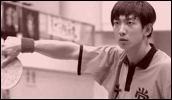Ping Pong
- Year
- 2002
- Original title
- Pinpon
- Japanese title
- ピンポン
- Director
- Cast
- Running time
- 114 minutes
- Published
- 6 August 2002


by Andrew Cunningham
Reading Taiyo Matsumoto's original five volume manga Ping Pong was one of the most surprising and gripping experiences I've had this year. But a huge reason for that is the artwork: he packs more kinetic energy into a single drawing of a shoe skidding across a floor than any real shoe has ever had. So it was with some trepidation that I saw posters for this adaptation going up in stores around Japan.
Fumihiko Masuri is a first-time director (not that you'd know it), with a background in computer effects. He seems to have directed this mainly because he's a really big fan of the manga too. On the film's website, they've placed images from the manga next to photographs of the actors in the film, so you can see how obsessive compulsive they were in matching faces. Not only faces, but movements, playing styles, and shot composition are all straight from the book, as if they'd used the manga in lieu of storyboards. Even the occasional surreal touch - a boy growing butterfly wings, a dragonfly landing on the net - comes right off the page onto the screen.
The ping pong matches themselves are shot with exuberant clarity. Edited rhythmically to nice ambient techno, they pace themselves subjectively. A return spins by so fast the player doesn't have time to react and we don't even see the ball, just hear it bounce. A player lunges for a ball just out of reach, or pulls off a contortionist miracle, and we watch in agonizing slow motion. CGI is used cleverly for close-ups of the ball hitting the paddle, which eloquently explain finer points of the game to those of us who may have played the game once or twice with a drunk uncle on Christmas but never really got the point.
There are two main characters here; the cocky, brash Peco, played by the extremely popular Yosuke Kubozuka, is a hero fallen off his game. His friend Smile (Arata), so named because he never does, is a much better player, but has been intentionally losing to his friend for years. Unfortunately, in the movie, the silent, stoic Smile gets short shift, since the outgoing Peco's transformation from asshole to hero is so much flashier than Smile's expressionless internal struggle.
Also playing major roles are their opponents: China, (Sam Lee), who has fallen off the Chinese national team and wound up, bitter, in Japan; Akuma (Koji Okura), who has put in more hours than anyone, but has no talent; and the fearsome Dragon, (kabuki actor Shido Nakamura), two-time champion, who locks himself in the bathroom to prepare for every match. Finally, there are the two teachers: Butterfly Joe (Naoto Takenaka), who sees in Smile a mirror of his own youth, and Obaba (Mari Natsuki, the best reason to sit through Samurai Fiction), who whips Peco back into shape. None of these stories go anywhere unpredictable, but that's the nature of the beast. Babble something about sporting archetypes if you find it bothers you. Odds are, you'll be having too much fun to notice.
That said, after an exhilarating opening snatched from the middle of the film for no good reason other than to start things off with a bang, the early half of Ping Pong is rather slow going. They've made the wise decision to tame down the early matches so that they have somewhere to build up to, but that, coupled with two leads that take their time making you like them, makes it all seem a bit perfunctory and dull. Movies like this demand a little patience on the part of their audiences. But by the time Peco starts to fly, all of that will be a distant memory.